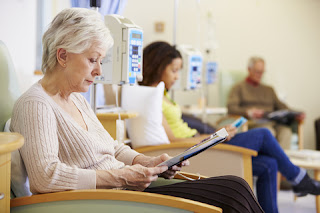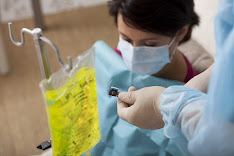Cancer treatments like chemotherapy can be tough on the body and the mind. One common challenge that some people face during and after chemotherapy is "chemo brain." This can make it hard to remember things, stay focused, and think clearly. More specifically, it's a mental fog, clouding thoughts, memories, and clarity, leaving behind mental fatigue.
To tackle this issue, it's important to understand the value of brain health and training. We'll delve into the importance of brain health and training, revealing how taking care of your brain can harness neuroplasticity, offering renewed hope and recovery for those experiencing the symptoms of chemo brain.
Chemo brain can impact your life in many ways. It might make it hard to remember important dates, manage your daily tasks, and even feel good about yourself. Feeling frustrated or anxious because of memory problems is common.
Taking care of your brain is like taking care of your body. Here are some simple ways to do it:
- Healthy Habits: Just like eating well and staying active are good for your body, they're also great for your brain. Regular exercise, eating nutritious foods, and getting enough sleep can help your brain stay in good shape.
- Keep Your Brain Busy: Doing activities that make you think can keep your brain sharp. Try puzzles, reading, or learning new things to give your brain a workout.
- Stay Social: Spending time with friends and family is not only fun, but it's also good for your brain. It keeps your mind engaged and helps you stay connected.
- Training Your Brain to Get Stronger! Think of brain training as being similar to training your muscles. You can do exercises to make your brain stronger and more agile as follows:
Concentration Boost: Try techniques like mindfulness meditation to help you focus better and pay attention more easily.
Solving Problems: Solve puzzles or play games that need thinking. These activities can improve your problem-solving skills and help your brain adapt to new challenges.
Use Brain Apps: There are apps designed to train your brain. They offer different games and exercises that you can do on your phone or tablet.
Train Your Brain: Learn about how to nourish your brain, and use it in a more effective way for more clarity, and better memory. The Long Live Your Brain online group brain training program can help!
CONCLUSION:
Dealing with chemo brain is no small task, but there are ways to overcome its challenges. By taking steps to keep your brain healthy through good habits, staying mentally active, and engaging in brain training exercises, you can make a positive impact on your cognitive abilities. Just like recovering from cancer, taking care of your brain is a journey that requires effort and dedication. With determination and the right strategies, you can improve your cognitive function and enhance your overall quality of life, even in the face of chemo brain.
For more information on the Long Live Your Brain program, visit our website at www.longliveyourbrain.com and schedule a free consultation with one of our dedicated brain health coaches.
MARILYN ABRAHAMSON, MA, CCC-SLP-CBHC : As a Brain Health Education Specialist at Ceresti Health, Marilyn offers initiatives that support the education and empowerment of family caregivers. Her latest endeavor is co-owner of BrainThrive Consulting and co-creator of the Long Live Your Brain© program, a fun and friendly online group brain coaching and training program for people striving for more reliable memory, attention, and clearer thinking. Marilyn’s prior work is as a NJ Licensed Speech-Language Pathologist since 1987 and is an Amen Clinics Certified Brain Health Coach.
EXCERPT FROM "LIVE CALM WITH CANCER (…AND BEYOND)" By: Tamara Green, LCSW & David Dachinger
DECISIVE DOCTOR VISIT
About a year after my initial diagnosis of stage IV head and neck cancer, I had a follow-up visit with my oncologist "Dr. C." After my vitals were taken and blood drawn, we had a brief wait in the bleak exam room.
During this exam, Dr. C. announced that my scans were clear and I was now officially cancer-free. He commented, “That was not an easy regimen (chemo, radiation and surgery) you just had, but you did phenomenally well!” He asked if there was actually something I did which helped me get through treatment in such good emotional and physical shape. I replied that I’d used a mindful wellness practice, listening to programs at the infusion center. His eyes lit up as he suddenly proclaimed, “That’s what I want for all of my patients!” He desired a way his patients could become calm before their exams or treatments.
As Dr. C. talked, Tamara’s eyes and mine met and a light bulb lit up. We’d been creating the Miracle Mondays guided meditation series for seven years, and we’d also recently lived through the cancer experience as patient and caregiver. Now my oncologist was pointing out a pain-point within his practice. As we exchanged huge smiles, we had our a-ha! moment: Loving Meditations was born.
RESEARCH-BASED RESULTS
Meditation has deep roots in research-based results. CancerNetwork.com, home of the journal Oncology, reported that mind-body practices like mindfulness meditation have been shown to “positively affect quality of life and biological outcomes” when used by cancer patients and healthcare professionals. [1] Let’s face it. Cancer and other major illnesses are scary, overwhelming, and stressful. How can we handle them with more ease?
[1] CancerNetwork.com, home of the journal Oncology “Mindfulness Meditation” by Susan Bauer-Wu, PhD, RN Oct 19, 2010 http://www.cancernetwork.com/oncology-nursing/mindfulness-meditation
As you watch Loving Meditations, Tamara’s calming voice, David’s expansive music and spectacular images shift you to a state of more calm. Our mindful techniques worked beautifully for us and also have helped thousands of people in over twenty countries.
RECHARGING FOR CAREGIVERS By: Dr. Leslie Valle & the Prevention101 Editorial Team  During the Covid-19 surge, interviews with emergency medical professionals showed dramatic cases of ICU and ER responders exposed to major signs of advanced fatigue and risk of burnout. This significantly raised major risks to their work performance where lives are to be affected, including theirs. Over time, double and triple shifts resulted in "a different type of pandemic" on a national scale- where this level of exhaustion and overwhelm. During the Covid-19 surge, interviews with emergency medical professionals showed dramatic cases of ICU and ER responders exposed to major signs of advanced fatigue and risk of burnout. This significantly raised major risks to their work performance where lives are to be affected, including theirs. Over time, double and triple shifts resulted in "a different type of pandemic" on a national scale- where this level of exhaustion and overwhelm. Where a leave of absence, a vacation or regular rest is not an immediate option, we can start with addressing BRAIN HEALTH AND MENTAL HEALTH. Modern meditation solutions (like BrainTap®, Loving Meditations® and other such technologies) are now available for exactly this emergent case as a portable personal "Rescue" dose. By tap ping the mind/body connection into a Vital Re-charge mode, we can induce a "Refresh- Revitalize-Renew" condition. As with conventional meditation, bringing you into a regenerative meditative state offers that level of rest, clears the mind for renewed focus and new energy to continue with the 'battle' at hand. |
WHAT, ME MEDITATE? We’ve heard folks say, “Yeah, but I have no time to meditate!” Looking at it another way, we don’t realize how many hours we actually spend watching the news, TV programs, or digital content on social media. Many of us devote significant time to this, sometimes to the point of addiction. Another common problem people mention about starting a mindful practice is that they can’t stop thinking and their mind is too “active” to meditate. They may have tried meditating in the past and found it difficult to sit and do nothing. Barraged by thoughts, they can’t shut them out. What if it was as easy as putting in earbuds and pressing play on the Loving Meditations App?
Within the recent decade, a higher level of focus on brain health has been a trending topic in headlines throughout medical community news. Public concerns about Alzheimer’s, Dementia, MS, ALS and other neurodegenerative diseases has driven advanced research in their diagnostics, therapeutics and prevention. According to Dr. Jay Lombard, “One of the most exciting opportunities in neuroscience research today is the use of strategies that protect the brain which may potentially prevent, delay or inhibit the progression of neurodegenerative diseases… this opportunity rests on our ability for early diagnosis. Research has shown that the likelihood of success for a given treatment-whether lifestyle changes or pharmacological approaches- is highly dependent upon early intervention, before the disease process has become too severe and potentially irreversible.” [1]
In addition, growing reports on Chronic Traumatic Encephalopathy/CTE (identified from head concussions) has prompted significant attention to this progressive brain condition. According to the National Health Service (UK), this disorder “is thought to be caused by repeated blows to the head and repeated episodes of concussion. It's particularly associated with contact sports, such as boxing or American football. Most of the available studies are based on ex-athletes”. [2]


















